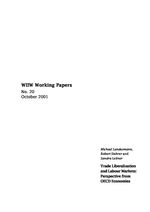Trade Liberalization and Labour Markets: Perspective from OECD Economies
Michael Landesmann, Sebastian Leitner and Robert Stehrer
wiiw Working Paper No. 20, October 2001
This study looks at the relationship between trade integration and labour markets for a group of OECD economies (USA, Japan, France, Germany, Netherlands, Sweden, United Kingdom). We examine particularly trade relationships between these OECD economies and different groups of 'Southern' economies: Southern Europe, the advanced South East Asian economies, a larger group of developing and catching-up economies, and transition countries from Central and Eastern Europe. The analysis uses a disaggregated data-set comprising 23 manufacturing industries for which production, employment and trade statistics were compiled. It looks at the differentiated pattern of trade integration over the period 1980-96 and examines labour market effects (on employment and on wages) both at a descriptive level and by means of econometric analysis. Evidence for trade effects on labour market variables is found, although the pattern of trade integration proceeds quite differently from what a Heckscher-Ohlin framework would expect. The pattern is much more compatible with a dynamic Ricardian model with catching-up features.
Keywords: trade liberalization, labour markets, OECD economies, North-South trade
JEL classification: C21, F14, F15, F16, L6
Countries covered: Germany, Japan, OECD, USA
Research Areas: Labour, Migration and Income Distribution, International Trade, Competitiveness and FDI
